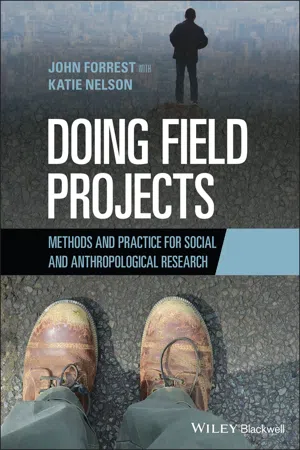
Doing Field Projects
Methods and Practice for Social and Anthropological Research
- English
- PDF
- Available on iOS & Android
Doing Field Projects
Methods and Practice for Social and Anthropological Research
About This Book
A must-read guide to conducting qualitative field research in the social sciences
Doing Field Projects: Methods and Practice for Social and Anthropological Research delivers a thorough and insightful introduction to qualitative field methods in the social sciences. Ideal for undergraduate students just starting out in fields like anthropology, sociology, and related subjects, the book offers readers twenty instructive projects. Each project is well-suitedas a standalone exercise, or several may be combined as a series of field work assignments.
From interview techniques to participant observation, kinship analysis, spatial mapping, photo and video documentation, and auto-ethnography, Doing Field Projects covers each critical area of qualitative fieldwork students are likely to encounter. Every project also contains discussions of how to execute the research, avoid common problems and mistakes, and present the uncovered data in several different formats.
This important resource also offers students:
- A thorough introduction to fieldwork, including the history of fieldwork methods, the shift from colonial to post-colonial anthropology, and discussion of fieldwork vs. ethnography
- Comprehensive explorations of getting started with fieldwork, including necessary equipment, research design, data presentation, and journal keeping
- Practical discussions of the ethics of fieldwork, including the "Do No Harm" principle, institutional approval, openness, and anonymity
- In-depth examinations of autoethnography, proxemics, mapping, recorded interviews, participant observation, and engaged anthropology
- The opportunity to conduct a complete fieldwork course using digital and online resources only
- Supporting learning material for each chapter, including a brief outline of Learning Goals and a paragraph summarizing the contents
Doing Field Projects: Methods and Practice for Social and Anthropological Research is the perfect guide for undergraduate students taking courses and programs in which qualitative field methods are central to the field, like anthropology and sociology.
Frequently asked questions
Information
Table of contents
- Doing Field Projects: Methods and Practice for Social and Anthropological Research
- Contents
- Preface (Including a Word to Instructors)
- Foreword (Including a Word to Student Readers)
- 1 Introduction
- 2 Getting Started
- 3 Ethics of Fieldwork
- 4 Research Design
- 5 Self-Study
- 6 Proxemics
- 7 Mapping
- 8 Recorded Interviews
- 9 Participant Observation
- 10 Engaged Anthropology
- 11 Process Documentation
- 12 Visual Anthropology
- 13 Sensory Observation
- 14 Performance
- 15 Life Histories (and Oral History)
- 16 Charting Kinship
- 17 Digital Ethnography (1) Social Media
- 18 Digital Ethnography (2) Online Gaming
- 19 Digital Ethnography (3) Human–Computer Interaction
- 20 Digital Ethnography (4) Online Meetings/Classes
- 21 Winding Down and Gearing Up
- References Cited
- Index
- EULA